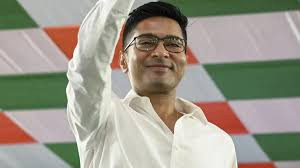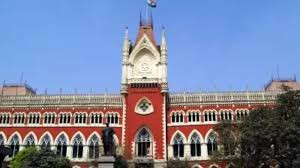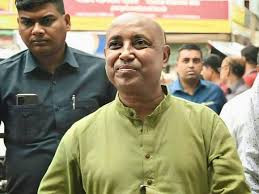Abhishek Banerjee Takes Charge as TMC Lok Sabha Leader as Internal Feud Prompts Shake‑Up

IIE DIGITAL DESK : The Trinamool Congress (TMC), Abhishek Banerjee, national general secretary and nephew of Chief Minister Mamata Banerjee, was appointed as the party’s leader in the Lok Sabha on August 4, 2025. He succeeds veteran MP Sudip Bandyopadhyay, who stepped down due to health concerns, at a virtual meeting of TMC MPs chaired by Mamata Banerjee herself .
Abhishek, a three‑time MP from Diamond Harbour and widely regarded as the party’s second‑in‑command, now shoulders the responsibility of leading the TMC’s 29-member Parliamentary contingent. The decision comes just ahead of the 2026 West Bengal Assembly elections, marking a generational transition within the party hierarchy .
Sudip Bandyopadhyay, who had served as Lok Sabha leader since 2011, had been absent from several parliamentary sessions in recent months due to prolonged illness. Though he indicated readiness to return, Mamata Banerjee preferred continuity under Abhishek’s stewardship while Sudip recuperates .
Simultaneously, Kalyan Banerjee, the party’s Lok Sabha chief whip, announced his resignation citing mounting internal strife and criticism over poor coordination among MPs. His decision appears tied to tense exchanges with party colleague Mahua Moitra, who had earlier described his campaign tactics as misogynistic in public remarks. Shortly after resigning, Kalyan suggested he might reconsider, following a call from Abhishek Banerjee. He declared that he would reassess on August 7, indicating possible negotiations behind the scenes .
Mamata Banerjee addressed the intra-party discord during the virtual meeting, emphasizing that “no individual is bigger than the party” and urging unity and discipline. Her intervention was followed by applause at Abhishek Banerjee’s appointment and an appeal for focus on external political challenges like the Special Intensive Revision (SIR) controversy, rather than internal disputes.
Abhishek Banerjee’s elevation is seen not just as a response to Sudip’s health issues, but as an intentional elevation of younger leadership. Within TMC, he has already played key roles, representing the party in national delegations—such as the Centre’s anti‑terror diplomacy outreach—and has often been the voice articulating party positions in contentious areas such as Bihar’s voter roll revision dispute.
This change also highlights the growing generational divide between party traditionalists like Sudip, Kalyan, and Saugata Roy, and the newer cohort led by Abhishek. Long-standing tensions had simmered beneath the surface, including disputes over public image, coordination in Parliament, and differing communication styles. Kalyan’s resignation in part underscores these deeper fissures .
For now, Abhishek Banerjee will oversee the TMC’s proceedings in the Lok Sabha until Sudip returns to full health. Meanwhile, Kakoli Ghosh Dastidar has been designated to oversee coordination until a new chief whip is formally named .
The reorganization signals a critical juncture for TMC as it prepares for high‑stakes political challenges. Mamata Banerjee’s guidance, Abhishek’s rise, and the fallout from internal disputes—all shape the party’s renewed focus on unity and electoral mobilization ahead of the Bengal assembly polls.
You might also like!














